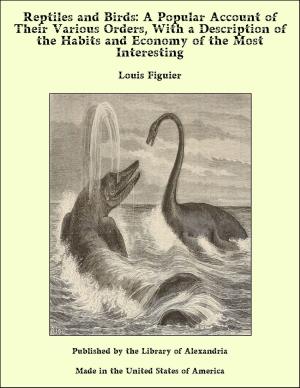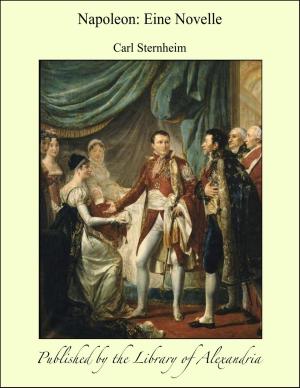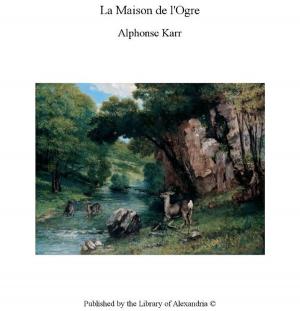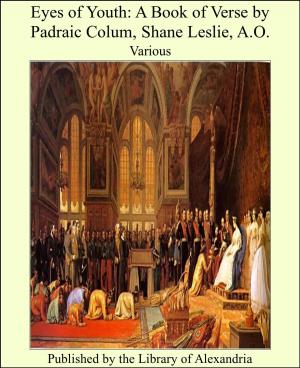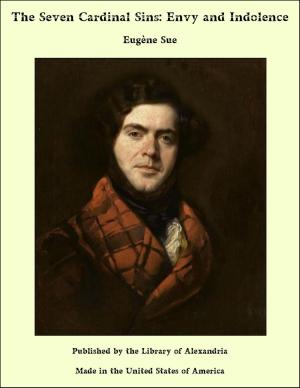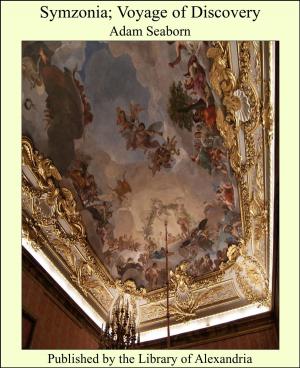The Confession of a Child of the Century (Complete)
Nonfiction, Religion & Spirituality, New Age, History, Fiction & Literature| Author: | Alfred de Musset | ISBN: | 9781465558398 |
| Publisher: | Library of Alexandria | Publication: | July 29, 2009 |
| Imprint: | Library of Alexandria | Language: | English |
| Author: | Alfred de Musset |
| ISBN: | 9781465558398 |
| Publisher: | Library of Alexandria |
| Publication: | July 29, 2009 |
| Imprint: | Library of Alexandria |
| Language: | English |
A poet has no right to play fast and loose with his genius. It does not belong to him, it belongs to the Almighty; it belongs to the world and to a coming generation. At thirty De Musset was already an old man, seeking in artificial stimuli the youth that would not spring again. Coming from a literary family the zeal of his house had eaten him up; his passion had burned itself out and his heart with it. He had done his work; it mattered little to him or to literature whether the curtain fell on his life's drama in 1841 or in 1857. More subdued sadness is found in 'Les Nuits' (1832-1837), and in 'Espoir en Dieu' (1838), etc., and his 'Lettre a Lamartine' belongs to the most beautiful pages of French literature. But henceforth his production grows more sparing and in form less romantic, although 'Le Rhin Allemand', for example, shows that at times he can still gather up all his powers. The poet becomes lazy and morose, his will is sapped by a wild and reckless life, and one is more than once tempted to wish that his lyre had ceased to sing. De Musset's prose is more abundant than his lyrics or his dramas. It is of immense value, and owes its chief significance to the clearness with which it exhibits the progress of his ethical disintegration. In 'Emmeline (1837) we have a rather dangerous juggling with the psychology of love. Then follows a study of simultaneous love, 'Les Deux Mattresses' (1838), quite in the spirit of Jean Paul. He then wrote three sympathetic depictions of Parisian Bohemia: 'Frederic et Bernadette, Mimi Pinson, and Le Secret de Javotte', all in 1838. 'Le Fils de Titien (1838) and Croiselles' (1839) are carefully elaborated historical novelettes; the latter is considered one of his best works, overflowing with romantic spirit, and contrasting in this respect strangely with 'La Mouche' (1853), one of the last flickerings of his imagination. 'Maggot' (1838) bears marks of the influence of George Sand; 'Le Merle Blanc' (1842) is a sort of allegory dealing with their quarrel. 'Pierre et Camille' is a pretty but slight tale of a deaf-mute's love. His greatest work, 'Confession d'un Enfant du Siecle', crowned with acclaim by the French Academy, and classic for all time, was written in 1836, when the poet, somewhat recovered from the shock, relates his unhappy Italian experience. It is an ambitious and deeply interesting work, and shows whither his dread of all moral compulsion and self-control was leading him. De Musset also wrote some critical essays, witty and satirical in tone, in which his genius appears in another light. It is not generally known that he was the translator into French of De Quincey's 'Confessions of an Opium Eater' (1828). He was also a prominent contributor to the 'Revue des Deux Mondes.' In 1852 he was elected to the French Academy, but hardly ever appeared at the sessions. A confrere once made the remark: "De Musset frequently absents himself," whereupon it is said another Immortal answered, "And frequently absinthe's himself!" While Brunetiere, Lemattre, and others consider De Musset a great dramatist, Sainte-Beuve, singularly enough, does not appreciate him as a playwright. Theophile Gautier says about 'Un Caprice' (1847): "Since the days of Marivaux nothing has been produced in 'La Comedie Francaise' so fine, so delicate, so dainty, than this tender piece, this chef-d'oeuvre, long buried within the pages of a review; and we are greatly indebted to the Russians of St. Petersburg, that snow-covered Athens, for having dug up and revived it." Nevertheless, his bluette, 'La Nuit Venetienne', was outrageously treated at the Odeon. The opposition was exasperated by the recent success of Hugo's 'Hernani.' Musset was then in complete accord with the fundamental romantic conception that tragedy must mingle with comedy on the stage as well as in life, but he had too delicate a taste to yield to the extravagance of Dumas and the lesser romanticists. All his plays, by the way, were written for the 'Revue des Deux Mondes' between 1833 and 1850, and they did not win a definite place on the stage till the later years of the Second Empire. In some comedies the dialogue is unequalled by any writer since the days of Beaumarchais. Taine says that De Musset has more real originality in some respects than Hugo, and possesses truer dramatic genius. Two or three of his comedies will probably hold the stage longer than any dramatic work of the romantic school. They contain the quintessence of romantic imaginative art; they show in full flow that unchecked freedom of fancy which, joined to the spirit of realistic comedy, produces the modern French drama. Yet De Musset's prose has in greater measure the qualities that endure
A poet has no right to play fast and loose with his genius. It does not belong to him, it belongs to the Almighty; it belongs to the world and to a coming generation. At thirty De Musset was already an old man, seeking in artificial stimuli the youth that would not spring again. Coming from a literary family the zeal of his house had eaten him up; his passion had burned itself out and his heart with it. He had done his work; it mattered little to him or to literature whether the curtain fell on his life's drama in 1841 or in 1857. More subdued sadness is found in 'Les Nuits' (1832-1837), and in 'Espoir en Dieu' (1838), etc., and his 'Lettre a Lamartine' belongs to the most beautiful pages of French literature. But henceforth his production grows more sparing and in form less romantic, although 'Le Rhin Allemand', for example, shows that at times he can still gather up all his powers. The poet becomes lazy and morose, his will is sapped by a wild and reckless life, and one is more than once tempted to wish that his lyre had ceased to sing. De Musset's prose is more abundant than his lyrics or his dramas. It is of immense value, and owes its chief significance to the clearness with which it exhibits the progress of his ethical disintegration. In 'Emmeline (1837) we have a rather dangerous juggling with the psychology of love. Then follows a study of simultaneous love, 'Les Deux Mattresses' (1838), quite in the spirit of Jean Paul. He then wrote three sympathetic depictions of Parisian Bohemia: 'Frederic et Bernadette, Mimi Pinson, and Le Secret de Javotte', all in 1838. 'Le Fils de Titien (1838) and Croiselles' (1839) are carefully elaborated historical novelettes; the latter is considered one of his best works, overflowing with romantic spirit, and contrasting in this respect strangely with 'La Mouche' (1853), one of the last flickerings of his imagination. 'Maggot' (1838) bears marks of the influence of George Sand; 'Le Merle Blanc' (1842) is a sort of allegory dealing with their quarrel. 'Pierre et Camille' is a pretty but slight tale of a deaf-mute's love. His greatest work, 'Confession d'un Enfant du Siecle', crowned with acclaim by the French Academy, and classic for all time, was written in 1836, when the poet, somewhat recovered from the shock, relates his unhappy Italian experience. It is an ambitious and deeply interesting work, and shows whither his dread of all moral compulsion and self-control was leading him. De Musset also wrote some critical essays, witty and satirical in tone, in which his genius appears in another light. It is not generally known that he was the translator into French of De Quincey's 'Confessions of an Opium Eater' (1828). He was also a prominent contributor to the 'Revue des Deux Mondes.' In 1852 he was elected to the French Academy, but hardly ever appeared at the sessions. A confrere once made the remark: "De Musset frequently absents himself," whereupon it is said another Immortal answered, "And frequently absinthe's himself!" While Brunetiere, Lemattre, and others consider De Musset a great dramatist, Sainte-Beuve, singularly enough, does not appreciate him as a playwright. Theophile Gautier says about 'Un Caprice' (1847): "Since the days of Marivaux nothing has been produced in 'La Comedie Francaise' so fine, so delicate, so dainty, than this tender piece, this chef-d'oeuvre, long buried within the pages of a review; and we are greatly indebted to the Russians of St. Petersburg, that snow-covered Athens, for having dug up and revived it." Nevertheless, his bluette, 'La Nuit Venetienne', was outrageously treated at the Odeon. The opposition was exasperated by the recent success of Hugo's 'Hernani.' Musset was then in complete accord with the fundamental romantic conception that tragedy must mingle with comedy on the stage as well as in life, but he had too delicate a taste to yield to the extravagance of Dumas and the lesser romanticists. All his plays, by the way, were written for the 'Revue des Deux Mondes' between 1833 and 1850, and they did not win a definite place on the stage till the later years of the Second Empire. In some comedies the dialogue is unequalled by any writer since the days of Beaumarchais. Taine says that De Musset has more real originality in some respects than Hugo, and possesses truer dramatic genius. Two or three of his comedies will probably hold the stage longer than any dramatic work of the romantic school. They contain the quintessence of romantic imaginative art; they show in full flow that unchecked freedom of fancy which, joined to the spirit of realistic comedy, produces the modern French drama. Yet De Musset's prose has in greater measure the qualities that endure



